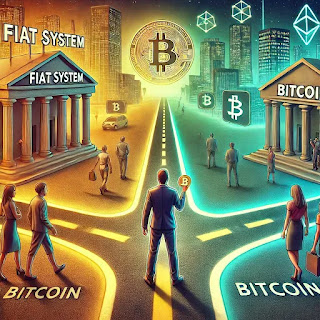From Kingdoms to Code: How Bitcoin Is the First Honest Ruler
Humanity has always knelt to a throne. Whether carved in stone, wrapped in velvet, or stitched into a corporate logo, power has worn many masks. For millennia, we've lived under kings, priests, presidents, and CEOs, all claiming to know what's best for us. But what if the best ruler… didn’t rule at all? What if we could build a system where corruption had no foothold, not because of laws or morality, but because the system itself made it impossible?
Welcome to the dawn of Bitcoin: the first honest ruler.
The Age of Kings and Myth Makers In the beginning, power was bestowed by the gods, or so we were told. Kings ruled by divine right. Pharaohs, emperors, and high priests claimed celestial authority. Their word was law, their lineage sacred. But behind every holy decree was a human hand, fallible and greedy. Decisions were made behind closed doors, enforced with swords, and justified with myths.
Corruption wasn’t an accident. It was built into the model.
From Thrones to Suits: Democracy and Corporate Rule We like to think we’ve come far. We vote now. We’ve got constitutions, term limits, and courts. But dig beneath the polished speeches and photo ops, and you’ll find the same old patterns. Political parties? Two flavors of the same product. Lobbyists write the rules. Central banks, run by unelected elites, print money with no cap, no consensus, and no consequences.
Meanwhile, the real power has drifted toward corporate behemoths. Apple decides what’s allowed on your phone. Google shapes what you see. BlackRock quietly buys the world. You’re not a citizen, you’re a user, a data point, a product. Surveillance has replaced taxes. And your consent is buried in a 47-page Terms of Service.
Code Enters the Arena But something shifted. In 2009, a pseudonymous figure named Satoshi Nakamoto released Bitcoin. No king, no company. Just code. Transparent, verifiable, and immutable.
Bitcoin doesn’t care about your title. It doesn’t care if you’re broke or a billionaire. It doesn’t have favorites, and it doesn’t negotiate. It simply runs. Tick tock. Next block.
It’s not managed by a boardroom. It’s not swayed by polls. It is governed by protocol, open source code that anyone can audit, but no one can corrupt. There are no favors to grant. No vaults to raid. No levers to pull.
Bitcoin: The First Honest Governor In Bitcoin, the rules are known and fixed. Every 210,000 blocks, the reward for mining gets cut in half. No debates, no delays, no press conferences. Just math. Just time.
You can’t inflate it. You can’t override it. You can’t bribe it. Bitcoin offers no bailouts, no stimulus packages, no insider deals. It doesn’t promise utopia. It promises fairness.
And in a world drowning in deception, that’s revolutionary.
The Shift: From Trusting People to Trusting Protocols Bitcoin doesn’t want your trust. It earns it. Every transaction is logged. Every rule is known. Every node is equal. It’s not about believing in a person, it’s about verifying the code.
This isn’t rebellion. This is evolution. Bitcoin isn’t storming the castle, it’s dissolving the need for one. It doesn’t want the throne. It wants the throne to disappear.
The Throne Is Empty, and That’s the Point Power has always been about who gets to make the rules. But Bitcoin flips the script. The rules are the ruler. No ego. No ambition. Just protocol.
In the past, we served kings and governments and brands because we had no better option. Now, we do. We can choose a system that doesn’t lie, cheat, or inflate. We can opt into a future where power doesn’t corrupt, because power doesn’t exist in the old sense.
Bitcoin doesn’t want to rule you. It wants to free you.
And that might just be the most honest form of power the world has ever seen.




Comments
Post a Comment